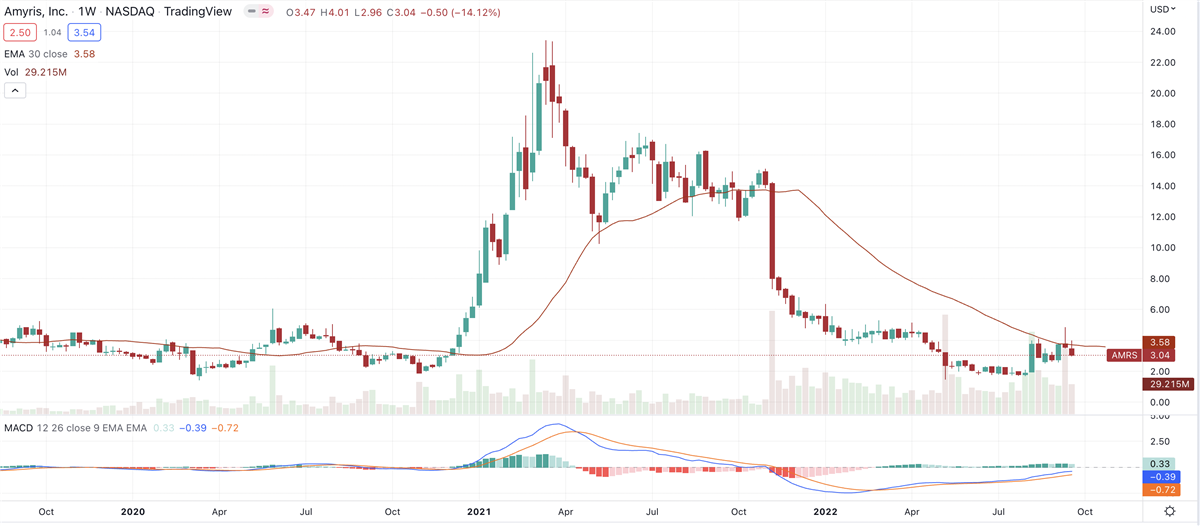- Synthetic biology company has been growing revenue through sales of consumer products at Sephora, and through its ingredients line of business
- In an exclusive interview with MarketBeat, portfolio manager Randy Baron said his models show the company will have a run rate of $1 billion in revenue by Q4 2023
- Baron expects the company to post net income in 2024

Biotech Amyris (NASDAQ: AMRS) appears well-positioned to capitalize on a growing interest in environmentally sustainable replacements for ingredients in consumer products.
California-based Amyris, which went public in 2010, is focused on a business called synthetic biology. It develops, manufactures, and markets patented ingredients from reusable sources such as sugar cane. The company’s molecules are already used by beauty-products manufacturers including Biossance, JVN, Rose, Costa Brazil and Pipette.
While these brands aren’t as well known as larger grooming and cosmetics manufacturers like Procter & Gamble (NYSE: PG) or Estee Lauder (NYSE: EL), they are popular with younger consumers who place importance on natural ingredients.
Amyris’ revenue has been growing at uneven rates, as data compiled by MarketBeat show.
In its most recent quarter, the company recorded sales of $65.2 million, up 25% from the year-earlier quarter. Revenue growth declined in the previous two quarters, but increased at double- or triple-digit rates in late 2020 through mid-2021.
The company has not been profitable, but the company’s strategy of targeting consumer brands has helped it weather a storm that other synthetic biology firms couldn’t.
In addition to shaky fundamentals, Amyris’ longer-term chart action is nothing to brag about, despite a recent rally.
Amyris Trending Higher Recently
The stock is down 43.81% year-to-date, but the picture is a little brighter on a three-month basis, where there’s an uptick of 41.40%. On a one-month basis, Amyris is up 16.92%.
Not surprisingly, it crumbled the week ended September 23, as the broader market also collapsed over interest-rate and recession worries. Amyris shares finished Friday at $3.04, down 14.12% for the week. Trading volume was lighter than normal.
The company was formed in 2003 and went public in 2010, which is actually a long time to be unprofitable, even in the notoriously unprofitable world of bioscience.
Amyris’ growth has been aided by its focus on a product called squalene, which is naturally acquired through shark livers. More than two million sharks are killed each year to harvest squalene.
The ingredient is utilized in products including CBD absorption, makeup, shampoo, and moisturizers. Amyris manufactures squalene from sugar cane, which is abundant and can be renewed easily, avoiding disruption to the marine ecosystem, as happens with shark-based harvesting of squalene. As with many industries, shark harvesting of squalene uses fossil fuels, so that’s another advantage of using a lab-based system.
According to MarketBeat data on institutional ownership, 143 institutional buyers purchased shares in the past 12 months, greater than the number of sellers.
This Manager Has Conviction In The Stock
One portfolio manager who has conviction about the stock is Randy Baron of Pinnacle Associates, headquartered in New York.
In an interview with MarketBeat, Baron explained that Amyris got its start as a maker of synthetic petroleum. “But the problem is: it’s small batch production. Think of it like brewer’s yeast,” Baron said.
That business plan was derailed by the shale revolution, which lowered the cost of oil from around $100 per barrel to $20. While other synthetic biology companies went bankrupt as business conditions changed, Amyris pivoted.
Baron said that as part of its process of developing synthetic petroleum, Amyris discovered the carbon chain that led to synthetic squalene.
“When you go to Sephora, one of the fascinating little secrets is squalene. It’s in products made by Loreal, Estee Lauder, Shiseido,” Baron said.
He adds that Amyris has been so successful in replacing shark-derived squalene, that its products now account for 60% of the global market for the chemical.
The fastest growing product at Sephora is a brand called Biossance that’s 100% owned-by-Amyris brand. No product of Biossance is less than 50% squalene,” Baron said.Consumer Business Attracts Ingredients Buyers
He added that Amyris has two business lines. The first is the consumer products, such as Biossance and JVN, developed with TV personality and hair-care entrepreneur Jonathan Van Ness. Both brands are sold at Sephora.
That line of business is designed to attract interest from other personal care product makers who then approach Amyris to buy ingredients.
Baron gave MarketBeat a prediction about Amyris’ prospects.
“This is a company that’s going to have a run rate of $1 billion in revenue, by the fourth quarter of next year - one year from now,” he said.
He added, “In my model, it will have net income by 2024.” He compared Amyris’ position in its industry today to where the Internet was in 1993.
“People care about this now a lot more than they did,” he said. “When you talk with young people today this is the no 1 thing they care about in these products: Clean chemistry.”














